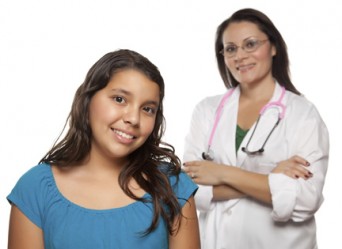 BY JENN B.
BY JENN B.
Lesbian.com
As women who are sexually active with other women, lesbians are often ignored when it comes to specialized medical treatment and health information. Women who sleep with women (WSW) are a sexual minority when it comes to research attention, specialized care and prevention focus. Unfortunately the result is that there is still a lot to be learned and understood about the specific health concerns for lesbians.
The majority of women’s health focuses on conceiving a child and giving birth, which leaves out a huge part of the health and well-being of WSW. Regardless if you plan on having child or not, for lesbians and everyone in between, it’s important to be an advocate for improving your own health. This means making the most out of your visits with your primary care physician and gynecologist.
For WSW, going to the doctor can be a frustrating experience because either you (as the patient) feel uncomfortable and not empowered to be open about your sexuality; or the doctor refuses to offer specific types of care based on your sexuality. Anyone who doesn’t feel like they can talk honestly about their sexual history with a medical provider greatly limits the quality of care a doctor can provide. Doctors can only help you with problems they are aware of and know about; more importantly they can’t prevent health problems without knowing the full story about who you are as a patient. Your health is a combination of a multitude of factors like who you interact with, your environment, the medical history and genetics. The more your doctor knows about all of these factors, the better your chances are at preventing major health problems from occurring in the future.
So how can you make the most out of your doctor’s visit? Here are a few tips on how to feel empowered to be your own health advocate:
• Come out to your doctor. While this can be incredibly uncomfortable for some women, this is the most important thing you can do to better inform your doctor. Whatever label you use — lesbian, queer, bisexual — explain to your doctor how you identify and what it means. This will help ensure that you receive the best care specific to your needs.
• Be honest about your sexual history. Telling your doctor if you have been sexually active with men, even if you identify as WSW, is important. Making this clear is key, as your doctor may wrongly assume that if you identify as a lesbian that you have not had sex with men. Again, this may be an awkward topic for discussion, but an important aspect of your sexual history. Also, don’t try to skimp on those numbers. Be honest about the number of people with whom you’ve been sexually active.
• Don’t be afraid to be the expert. The internet can be a wonderful tool and you should be empowered to use it. Nationally recognized organizations and health-focused government agencies are great places to start researching any type of health topic. Also, don’t be afraid to stand your ground on getting tested or screened for specific health issues, even if your doctor doesn’t feel you need it. A perfect example of this is getting tested for certain STDs and HIV/AIDS. Many lesbians, myself included, have experienced doctors’ refusal to test for STDs and HIV/AIDS because of our sexuality. Remember you are the patient and you can be firm in your request to be tested for anything you feel is necessary.
• Bring support if you need it. This can be an uncomfortable experience for some, so bring a friend or family member along. Sometimes having someone there to be a source of support can make you feel more at ease with being open and honest with your doctor.
Are you still hungry for more information about lesbian specific health issues? Here are some of my go-to places to look online for up-to-date information, the latest research and journal articles, and all around great sources of information.
The Mautner Project of Whitman-Walker Health
A national organization dedicated to the health of women who have sex with women, The Mautner Project has partnered with Whitman-Walker Health to provide excellent resources and care to lesbians.
The Lesbian Health & Research Center
This lesbian health focused organization is partnered with the University of California, San Francisco, and offers great resources for patient, healthcare providers and other important stakeholders.
Office on Women’s Health
The Office on Women’s Health is part of the U.S. Department of Health and Human Services (HHS) and offers a large of amount of women’s health information some of which is focused on lesbian and bisexual women. While some of the information is limited, this is a great place to go to see where the government is focused on regarding lesbian health.
And of course, Lesbian.com! Check our Resources page and our Health channel to find more information about your health.
Jenn B. holds a Master in Public Health with a focus on women’s health as well as a Bachelor’s degree in psychology.







Good article. I came out to my PCP several years ago and he said, ” Oh, that’s good. Did you know I’m gay?” it opened alot of good healthy discussion for us. And there are things he understands that I kmow a straight doc would not.
It is about the best health for you and being open with your doc is part of that!